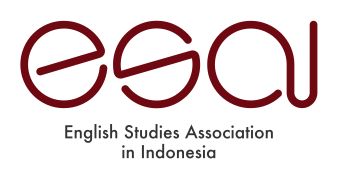Oral Corrective Feedback Strategies and Learner Uptake in EFL Setting
Abstract
This study investigates the strategies of oral corrective feedback applied by senior teachers in EFL speaking classes. It is to shed light on whether those strategies used are effective to lead the repair uptake. Additionally, it is to find out the attempts done by the learners to repair their errors. This study applies a qualitative method that uses classroom observations as the technique for collecting the data. The data are taken from speaking classes taught by three senior teachers in three universities. The study reveals that the corrective feedback strategies of correct forms elicited were effective to lead to repair uptake. Those were elicitation, clarification request, repetition, and metalinguistic cue. Related to uptake, the learners attempted to achieve well-formed sentences by the process of Needs Repair to Repair uptake. It involved the same errors and acknowledgment for Needs Repair and incorporation, repetition, and self-repair for repair uptake. It is recommended that teachers apply the correct form elicited corrective feedback strategies to correct learners’ erroneous forms and provide the uptake since it is the learning process.
Keywords: Oral Corrective Feedback strategies, Learners’ uptake, Repair, Needs Repair
Full Text:
PDFReferences
Amalia, Z.D.H., Fauziati, E., & Marmanto, S. (2019). Male and female students’ preferences on the oral corrective feedback in English as a foreign language (EFL) speaking classroom. Humaniora, 10 (1), 25-33
Drew, Paul and Heritage, J. (1992). Analyzing talk at work; an introduction. In P. Drew and J. Heritage (eds.), Talk at work: interaction in institutional settings. Cambridge: Cambridge University Press.
Ellis, R. (1994a). Classroom Second Language Development. Oxford: Pergamon
Ellis, R. (2008). The Study of Second Language Acquisition. Oxford: Oxford University Press.
Ellis, R. (2012). Language Teaching Research & Language Pedagogy. Oxford: Wiley-
Blackwell.
Lyster, R. et all, (2013). Oral corrective feedback. Language Teaching, 46 (1), 1-40
Lyster, R., & Ranta, L.(1997). Corrective feedback and learner uptake: Negotiation of form in communicative classrooms. Studies of second language acquisition, 19(1), 37-66
Mori, R. (2010). Teacher cognition in corrective feedback. System 39, 451-467.
Phuang, Tran Thi Bich., & Huan, Nguyen Bau. (2018). Teacher corrective feedback on students’ speaking performance and their uptake in EFL classes. European Journal of Foreign Language Teaching, 3(3): 110-131
Saswati, R. (2018). Analysis of classroom Interaction using IRF pattern: a case study of EFL conversation class. Scope: Journal of Language Teaching, 3(1): 29-37
Sheen, Y. (2011). Corrective feedback, individual differences and second language learning. New York: Springer
Walsh, S. (2002). Construction and obstruction: teacher talk and learner involvement in the EFL classroom. Language Teaching Research, 6:3-23
Walsh, S. (2011). Exploring Classroom Discourse: Language in action. Canada: Routledge.
DOI: http://dx.doi.org/10.30813/jelc.v12i1.2907



2.jpg)



